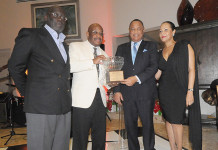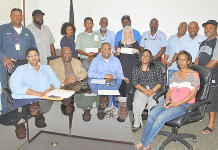
By ADRIAN GIBSON
ajbahama@hotmail.com
OF late, the economic crisis besetting the country has shown that there’s a need for a greater commitment to the creation and strengthening of our internal dynamics and the empowerment of Bahamians by strategic planning mechanisms. Indeed, in recent years economic hardship and a lack of regulatory enforcement has led to a greater manifestation of the ever-present parallel economy – for example, the proliferation of phone card vendors, street vendors selling food from vehicle trunks on road sides and on construction sites, peanut vendors, fish vendors, makeshift roadside stalls, etcetera.
Undoubtedly, the government must take small steps to become more self-sufficient, conducting an inventory of overseas purchases and removing those items that we can produce (chicken, eggs, onions, etc), whilst setting economic milestones. We have a legacy of dependency. In strengthening the economy, more monies must also be allocated to farmers and fishermen.
That said, in his contribution to the debate on a revised Business License Bill on July 26th, Health Minister and Killarney MP Dr Hubert Minnis questioned whether we “are considered a society that follows laws or are we an undisciplined society?” In doing so, he sought to address the rise of the “parallel-economy”, referring to personal experiences when discussing some of the negative societal “transitions” that afflicts Bahamian society.
According to the doctor, of significance to that particular debate was his observance of a plethora of unlicensed street vendors throughout Jamaican society when he began his studies there in 1975. The same, he said, is increasingly becoming evident in our society.
“What was significant, especially to this particular Bill, is that there were multiple street vendors throughout society and especially when you went downtown (where) there were multiple street vendors in front of stores and they were so cluttered and compressed together that even if you were trying to get into a store you had difficulties getting into the store without walking over vendors. Mr Speaker, that is what can happen in an unregulated, undisciplined society. And just as we have gone through that transition with the bars around windows and doors that I thought never could happen (here), we should not wait until we go through this next transition where street vendors are in front of all stores–be it Bay Street, Palmdale or wherever–so that individuals cannot get into stores without having to walk over street vendors. Mr Speaker, that is referred to in Caribbean societies as taking over….,” Dr Minnis said.
Driving about the streets of New Providence, one can easily spot a fish, fruit, crab or any other type of vendor on nearly every street corner. Undoubtedly, these participants in the small business sector must be licensed to, as the minister notes, “be introduced into (the) formal financial or business society to make contributions to national insurance and take part in the benefits of national insurance.”
As a doctor, the parliamentarian discussed the dangers of purchasing fish from roadside vendors, noting that the hot environment leads to “immediate decay or putrefaction” of the fish and that improper storage facilities causes the fish to undergo rapid change and leads to food poisoning. The presence of flies and an assistant standing nearby swatting them away with a branch only worsens the unsanitary situation. Dr Minnis also noted that fruit, when exposed to heat, can also lead to food poisoning and that the widespread sale of these items can greatly impact the health sector.
Moreover, the increasing presence of mechanics shops in residential communities not only can cause the property value of one’s dream home to depreciate, but the oil and gas leakage into the surrounding water table can be toxic and harmful to all residents. Town planning regulations must be enforced!
According to a survey conducted in the Killarney constituency by Aaron Knowles, of 60 street vendors 55 preferred a formalized business environment where they had licenses and identification granting them permission to sell their wares in a particular area, without fear of harassment. Furthermore, it was discovered that these vendors believed that such a regulated environment would allow them to increase their revenues and opportunities while cutting-out illegal immigrants who would be unable to qualify for licenses.
What I found most meritorious is Dr Minnis’ vision for the establishment of an open space in a particular location that would be assigned to vendors and would be “large enough to pave or tile,” while being inclusive of a proper slope that allows for runoff into a drainage system. He proposed that it be enclosed.
The suggestion that particular days be assigned to certain types of vendors could potentially reduce street hawking and establish an orderly business format in what has traditionally been an informal, chaotic sector. According to the doctor, on Mondays seafood vendors–with mobile, properly refrigerated carts that are consistently inspected–would utilize such a site; Tuesdays would be declared floral and fruit day and these vendors would display their wares; Wednesday would be food fair day; Thursdays would be dedicated to the arts and crafts and local writers could have book sales and signings, singers and musicians could sell CDs, junkanoo items could be for sale and on display, etcetera; on Fridays there could be an open flea market that everyone can attend, and Saturdays/Sundays would be “family island day” where family islanders or persons representing respective islands could display items unique to each island.
The Health Minister proposes that a private entity be contracted to clean and wash down the area everyday, that the assignment of specific days for various vendors and the use of mobile carts would prohibit overly aggressive vendors from claiming squatter’s rights to a specific spot, and that a regulated system–where security is ensured–would be set up.
Indeed, as Dr Minnis asserts, such an environment–where regulations are enforced–would yield great returns, improve hygiene and cleanliness, create jobs and opportunities for locals and improve our tourist product as tourists would be aware that on any given day they could visit the centre and be immersed in a truly Bahamian experience.
On a recent trip to Grand Bahama I noted that there was little sign of the hawking and illegal street vending that has infamously become a part of the New Providence experience. In a newscast this week, I noted that authorities in the second city are considering licensing vendors and establishing such a market area as proposed by Dr Minnis.
I have long said that law enforcement authorities should, using section 212 of the Penal Code, take to the streets and conduct a dragnet operation to address infractions and minor illegal acts that, residents of Freeport would say, could never openly transpire under the governance of the Grand Bahama Port Authority.

Bran McCartney and the FNM’s cancelled convention
Last week, the FNM Council seemingly rebuked Branville McCartney and his leadership aspirations when they–the party’s internal political apparatus–unanimously voted against having a convention this year. Undoubtedly, it appears that this time around, Mr McCartney was checkmated in a game of political chess. The Council blindsided the former state minister in what, I’m told, was also an attempt to puncture Mr McCartney’s ego by some who have come to see him as a cheeky young cub who is trying to murky the political waters and take out Prime Minister Hubert Ingraham preceding what proposes to be a brutal general election cycle.
Frankly, in our politically obsessed islands, the decision not to have a convention was most disappointing. Moreover, holding a convention next year leaves one to wonder if the FNM will enter a general election devouring themselves as the atmosphere–as has been seen in the lead-up to the 2002 general elections–can become quite poisonous.
According to lawyer and physician Dr Dexter Johnson, while the PLP employs a “nobody move, nobody get hurt front going into a united convention, the FNM as the government does not want to run the risk of splits, schisms and polarization at this juncture.”
“McCartney is in a bad position and he is being seen as promoting schism within the FNM. With the declining popularity of the party, they cannot have internal discord,” he said.
Dr Johnson further stated:
“Bran remains a silent player and with each passing day, his image as a leader seems less and less. You cannot be a silent member of the choir and expect to enhance your claims for leadership. When Hubert Ingraham was branching out, his stature as potential leader grew because of the stances he took in public and in Parliament, challenging the record and role of the Pindling administration and using information to embarrass them on many occasions. So, silence on the part of McCartney–a self-imposed silence–does not show him as capable of taking and supporting an independent position on behalf of any cause currently at issue. What has he said about Baha Mar, about any of the critical issues? Ingraham challenged the PLP on critical issues and deepened the democracy for the people.”
“At the national council level, McCartney is way down the list of persons who the FNM wants for future leadership. For them he is not seen as the inevitable choice. He must stand for a cause, get in the trenches and stop playing politics. A leader leads on issues. (Randol) Fawkes led on labour issues, Janet Bostwick championed women’s causes and children’s rights, Doris Johnson championed equality for women, etcetera. True leaders declare themselves and challenge the status quo. Ingraham did that! For McCartney, coat-tailing comes with a price,” Dr Johnson stated.
Notably, there are some who disagree with Dr Johnson’s sentiments about Mr McCartney, one such source simply stating that “if not McCartney, then the FNM will have to go to Jerome Fitzgerald (PLP Senator) and ask him to come back home.” Of course, Mr Fitzgerald has previously denied any membership ties to the FNM.
Frankly, Mr McCartney is an affable fellow whose drive and youthful vigour is refreshing. Although he was casually dissed in his attempt to pick the leadership lock, he has seemingly captured the imagination of the youth and galvanized young and old alike to view him favourably. He has become seen as a political darling for people of differing political stripes and, for others, a bigheaded hotshot who is overreaching.
At this juncture, while the nation knows that Mr McCartney is apparently not interested in playing second banana, the Council’s vote must have been a humbling experience for him and seemingly represents the position of the party’s hierarchy that he is in need of political seasoning and should seek to understudy Prime Minister Ingraham, who is a tactical populist and remains a political titan and one of the most revered voices in local politics.
Condolences to the relatives of the victims of Flight 402 and excellent service at Kelly’s
I wish to extend my sincerest sympathies to the families of all the men who lost their lives in Tuesday’s tragic plane crash. It is my fervent hope that they find solace during this time of bereavement.
Furthermore, I wish to commend Mrs Denise Darville, an employee of Kelly’s (Mall-at-Marathon), for the excellent service she provided Wednesday evening. Mrs Darville was hands-on, patient and the consummate professional. She is representative of the type of customer service personnel that is so desperately needed in both the public and private sectors but has become a rare commodity. The Kellys family should be proud to have such an efficient employee representing their business interests.







